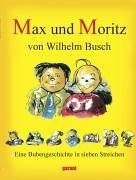What do you think?
Rate this book


32 pages, Hardcover
First published January 1, 1865
Ach, was muss man oft von bösen________________
Kindern hören oder lesen!
So beginnt diese Geschichte
von Max und Moritz: Bösewichte.
Daraus ein Drama sich entspinnt,
ein Augenschmaus für jedes Kind.
Ach, was waren das für Zeiten
als ich las die Herrlichkeiten:
Die Geschichten von Herrn Busch
und die Bilder, die er schuf.
Malt mit Feder, malt mit Lauten
War der erste, der sich's traute.
Zack – war wieder mal ein Reim nur
so hingezaubert mit Bravour.
Die Behörden war'n dagegen
sperrten seine Bücher wegen
der eindeutigen Sprache
und der Kritik an Mensch und Sache.
Wilhelm Busch, dem war's nicht wichtig
malte, schrieb und blieb scharfsichtig.
Karikatur, Groteske und
das Makab're war sein Grund.
Den Plisch, den Plum, und Fipps den Affen,
und auch Hans Huckebein hat er erschaffen.
Dabei sind Max und Moritz,
seines Geistes schönster Blitz,
noch frisch – nicht fromm – aber ganz frei
zu lesen in der Bücherei.
's hat mich bewogen mal zu diesen
Reimen zu greifen, diesen fiesen.
Doch Busch sei Dank, bald ist's vorbei
Mit dieser Review-Schreiberei.
Nur ein Ding will ich noch loswerden
denn Max und Moritz sind auf Erden
nun doch schon hunderfünfzig Jahre.
Das sagn' wir Glückwunsch, Tusch, Fanfare!
